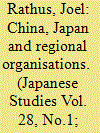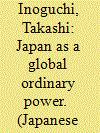| Srl | Item |
| 1 |
ID:
081271


|
|
|
|
|
| Publication |
2008.
|
| Summary/Abstract |
This paper assesses the impact of recent upgrades in security ties between Australia and Japan and their implications for the bilateral relationship. In particular, the development and future of the Joint Declaration on Security Cooperation (JDSC) is assessed. It is argued that former Prime Ministers Abe and Howard encouraged the enhancement of security ties to unprecedented new highs, but that the rise of China and leadership change in Japan and Australia in 2007 will make the prospects of a full security treaty unlikely
|
|
|
|
|
|
|
|
|
|
|
|
|
|
|
|
| 2 |
ID:
081272


|
|
|
|
|
| Publication |
2008.
|
| Summary/Abstract |
This paper examines the impact of 'the rise of China' on the Asian Development Bank (ADB), and its implications for Japan. Japan has traditionally enjoyed a dominant position in the Bank, as it has enjoyed a dominant position in Asia. However, with the balance of power in the region tipping in China's favour, one might expect that this would be reflected in the ADB as well. This paper argues that despite the worsening Sino-Japanese relationship, the ADB has facilitated the development and maintenance of shared expectations between the two parties over the future direction of development assistance, representing an oasis of liberal institutionalism in a relationship increasingly characterised in realist terms.
|
|
|
|
|
|
|
|
|
|
|
|
|
|
|
|
| 3 |
ID:
081266


|
|
|
|
|
| Publication |
2008.
|
| Summary/Abstract |
Japan's self-defining foreign policy role has been evolving on the basis of alliance with the United States since 1945. The author argues that depending on the changing terms of alliance with the United States, Japan has been adjusting its role roughly every 15 years: domestic contestation over alliance (1945 - 1960), free rider or Yoshida doctrine in practice (1960 - 1975), systemic supporter (1975 - 1990), global civilian power (1990 - 2005) and global ordinary power (2005 - 2020). In this article the author argues that the three key conditions for global hegemony, military, currency and demographic hegemony, will be met by the United States to varying degrees until the second quarter of this century. The author speculates that Japan's foreign policy role will evolve on the assumption of a continuing United States leadership role, albeit with far more dependence on market conditions and power calculations abroad.
|
|
|
|
|
|
|
|
|
|
|
|
|
|
|
|
| 4 |
ID:
081270


|
|
|
|
|
| Publication |
2008.
|
| Summary/Abstract |
Japan's constitutional revision and resultant remilitarization can affect the balance of power in the international system beyond its national borders. This paper critically analyzes the constitutional revision debate in contemporary Japan and the implications for Japan's foreign relations if or when it becomes constitutional for the island nation to possess military forces. It argues that justification for constitutional revision is based on political myth rather than historical reality and rational analysis, and also that a militarized Japan will not enhance its independence or international prestige. Rather, there is the great fear that a new Japan will be further subordinated to the United States as a critical part of the latter's global strategy and defense mechanism
|
|
|
|
|
|
|
|
|
|
|
|
|
|
|
|
| 5 |
ID:
081273


|
|
|
|
|
| Publication |
2008.
|
| Summary/Abstract |
The concept of 'human security' was created by the UNDP in 1994 when the international community became aware of emerging transnational threats following the Cold War. Since then, the Canadian government has developed the idea into an emerging norm of 'responsibility to protect' which requires the international community to rethink traditional notions of state sovereignty and seriously consider guidelines that encourage humanitarian intervention, an approach that has been widely endorsed. The Japanese government, in contrast, has promoted the idea of human security as poverty reduction and human empowerment. This paper examines the limits of Japan's human security policy by examining its background in the geopolitics of the Asian region and its consequent grounding in the principles of state sovereignty and non-interference in domestic affairs. It concludes by suggesting that the success of Canada's human security policy reflects the transformation of the security paradigm after the Cold War and that Japan has not yet become fully aware of this profound transformation in its own security considerations
|
|
|
|
|
|
|
|
|
|
|
|
|
|
|
|
| 6 |
ID:
081269


|
|
|
|
|
| Publication |
2008.
|
| Summary/Abstract |
Tokyo claims that peace-building has become a key pillar in its foreign policy. A litmus test of this rhetoric is Japan's peace-building efforts in conflict-ridden Mindanao. Japan's partnership with Malaysia, Libya and Brunei (all Organization of Islamic Conference members) to address the conflict between the government of the Republic of the Philippines and the Moro Islamic Liberation Front is significant because it is a diplomatic milestone beyond the frameworks of the US - Japan Alliance and the United Nations. If Japan were to succeed in Mindanao, peace-building might well be a promising 'third path' in its international relations-beyond an inward-looking 'one-country' pacifism or over-dependence on its US ally for its foreign policy direction. Interviews with serving diplomats and other key players are used to offer additional insight.
|
|
|
|
|
|
|
|
|
|
|
|
|
|
|
|
| 7 |
ID:
081267


|
|
|
|
|
| Publication |
2008.
|
| Summary/Abstract |
Having maintained a low-key relationship since early postwar, Japan today shows increasing interest in India as a rising economic and regional power. The two nations are now developing ties in many areas consequent with India's ascent, most importantly in politico-strategic matters. This strategic development is intriguing as Tokyo was one of the most critical voices condemning New Delhi's decision to conduct nuclear testing in 1998, when the relationship reached its nadir. So why this strategic repositioning and why now? This article explores Japan's move towards India as an attempt to balance and bandwagon strategically. Japan's strategic thinking now recognises India as potential balance for Japan against China while Japan bandwagons with the United States in response to both India and China as rising Asian powers.
|
|
|
|
|
|
|
|
|
|
|
|
|
|
|
|
| 8 |
ID:
081268


|
|
|